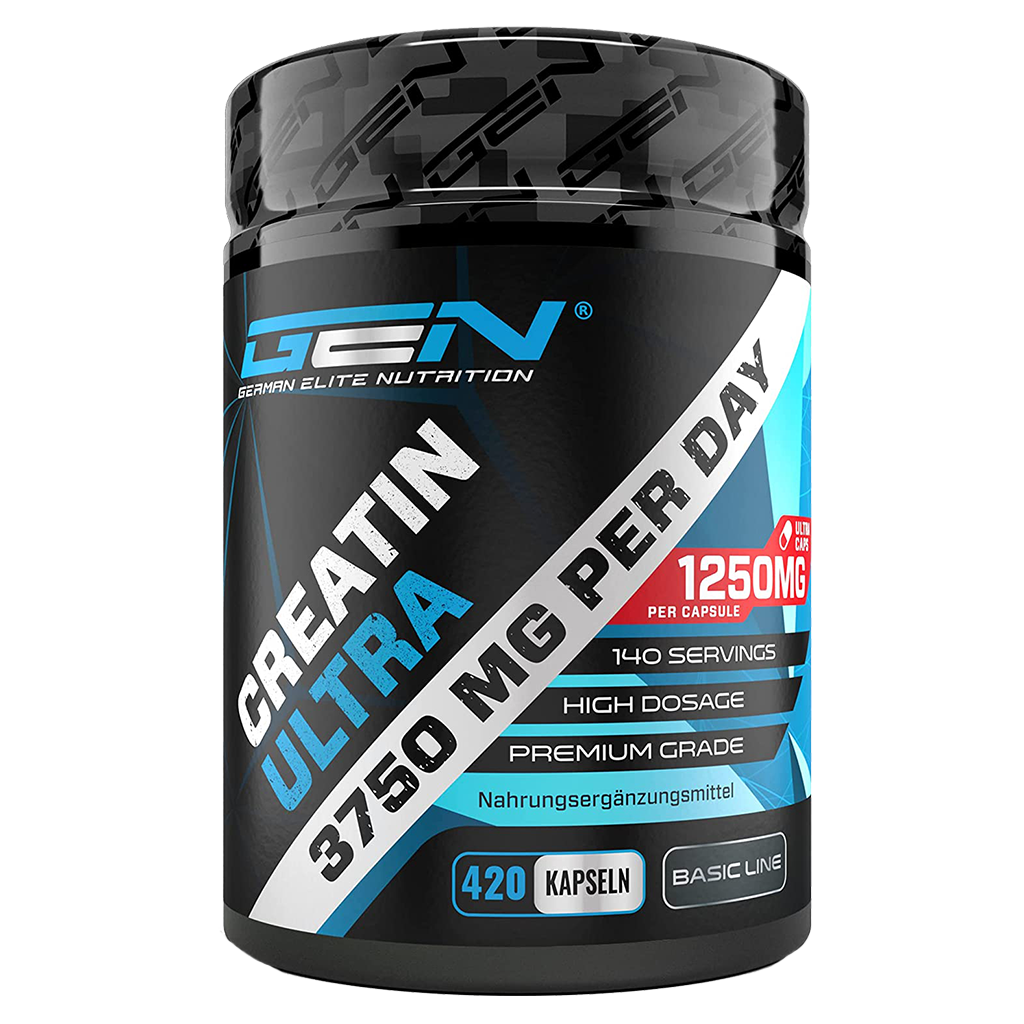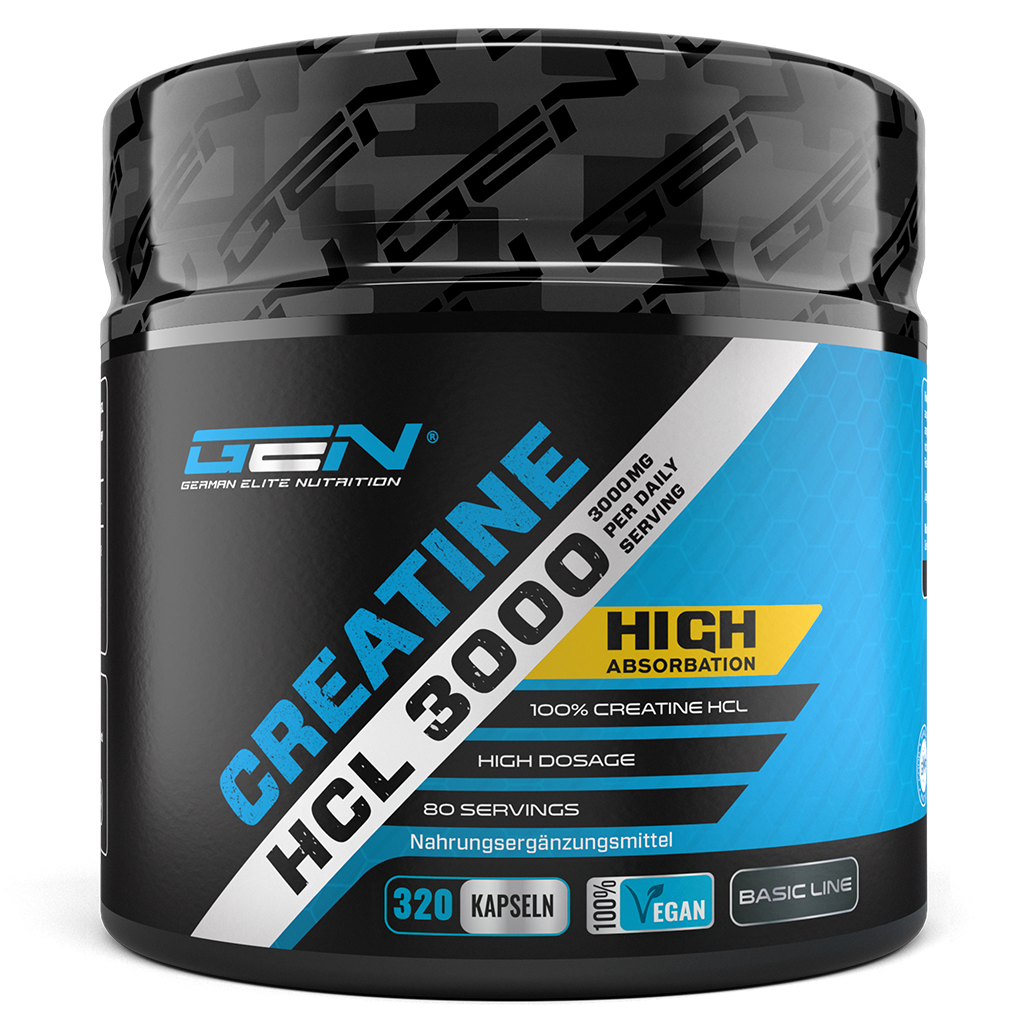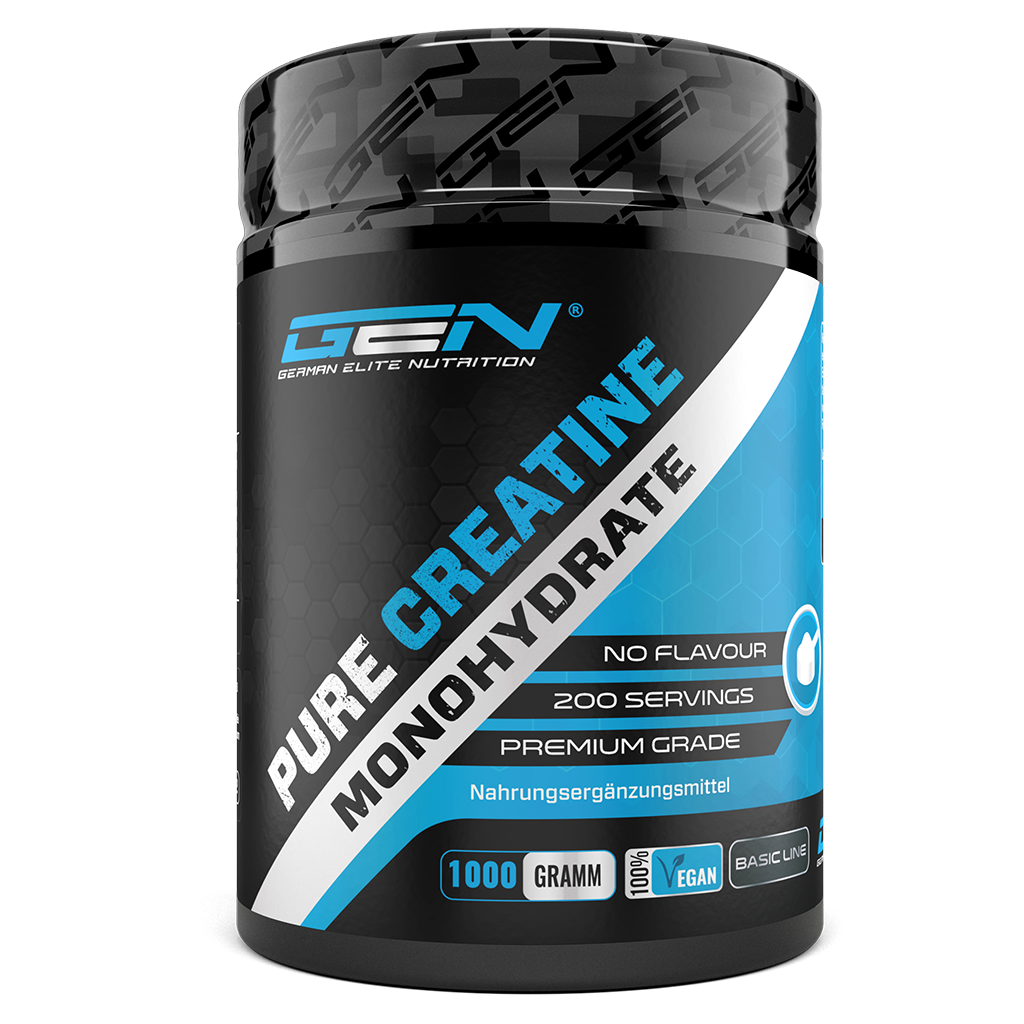Around no other dietary supplement there is so much hype and myths, as around creatine monohydrate. Creatine monohydrate (often creatine monohydrate) is probably by far the most researched and used product in the sports sector and a true bedrock among the mass of supplements that exist on the market. How it really stands around the hype of creatine, which myths are actually true, what effects and side effects you can expect when taking creatine and how much creatine you should take best, you can find out here!
Creatine monohydrate is one of the few supplements whose effect is clearly proven. Accordingly, Creatine has also been created an entry in the EFSA (European Food Safety Authority). The Creatine Health Claim reads as follows:
"Creatine enhances physical performance during high-speed strength training in the context of short-term intense physical activity. The claim may only be used for foods whose consumption ensures a daily intake of 3g of creatine. For the claim to be permitted, consumers must be informed that the beneficial effect occurs with a daily intake of 3g of creatine."
What is creatine actually?
Creatine is a substance produced naturally in the body, mainly in the liver, but also in the building salivary gland and kidneys from the amino acids arginine, glycine and methionine. The main task of creatine is to ensure the provision of energy supply.
Brief explanation to better understand the exact task of creatine: Adenosine triphosphate (=ATP) is a molecule in our body that provides energy in every cell of our body. This ATP molecule consists of a total of 3 phosphate groups (hence the name adenosine triphosphate). As soon as the body needs energy, one of the 3 phosphate groups is split off and the required energy is thus released. After the cleavage of a phosphate group, the ATP is now missing one of the 3 original phosphate groups, turning it into ADP (andenosinediphosphate). In order to now be able to restore ATP, the body needs creatine. Creatine is produced by the body itself and is in the form of creatine phosphate. Creatine phosphate is a phosphate group that can bind to ADP (andenosinediphosphate). The binding of creatine phosphate to ADP creates the desired and necessary ATP.
The human body produces 1 to 2g of creatine daily, which is normally consumed again through the daily energy supply. Creatine can also be absorbed through various foods. For example, meat and fish also contain creatine (about 5g / 1kg). Here you can quickly see why an additional supplementation with creatine is also so useful to achieve more athletic success.
The more creatine is available to the body, the greater the energy supply! However, in order to reach the creatine content, which has a significant effect, a 100kg athlete, for example, would have to eat about 2kg of meat. Why this is so and how to calculate this, will be explained in the further text.
Proven effect of creatine!
Creatine has been shown to increase performance and therefore muscle growth. A wide variety of studies and meta-analyses have shown that subjects (*1) taking creatine were able to bench press 6.85 kg more and squat 9.76 kg more than subjects taking placebo creatine alone. This increase in strength corresponded to approximately 10-15% compared to the placebo group.
In another study (*2), creatine was shown to block myostatin by approximately 17%. Myostatin is a protein in the body that is considered a catabolic regulator of skeletal muscle and is responsible for breaking down or inhibiting the buildup of muscle.
Some other studies (*3/*4) suggest that creatine generally has anti-catabolic properties. Catabolic = degrading / anticatabolic = preventing degradation.
But other effects have also been noted. Such as an improvement in memory performance (*5) and especially better short-term memory performance (*6) and better cognitive function and reaction time (*7) - especially in vegetarians or vegans.
Creatine in the diet - is it useful?
There is a widespread myth that creatine should not be used in a diet or during a definition phase because it "pulls" water and makes you look bloated. This is absolutely not the case! Because our muscle consists of about 75% water anyway. Creatine only fulfills the function of storing additional water in the muscles - nowhere else!
It would also be a contradiction in terms to say that creatine should never be used in a diet, but in the same breath advise (at the end of a diet) to reduce carbohydrates and greatly increase the amount of protein. Especially advanced athletes eat at the end of their diet (depending on body weight etc.) sometimes far more than 1kg of lean meat. Which in turn also contains more than 5g creatine.
In practice, it actually makes sense to take creatine during a diet. Because especially in the phase in which less food is consumed, the body needs sufficient energy. This energy can be provided by the increase of creatine can. By the more energy, especially in the diet, you keep your performance more upright than without creatine, which in turn allows more calories to be burned. A meta-analysis (*8) proved that creatine can even promote fat burning - however, creatine itself does not burn fat!
How much creatine per day is useful? The rule of thumb of creatine dosage
There are also many myths about this and everyone does it a little differently. According to some studies, the ideal value is 1g creatine per 10kg body weight. This makes perfect sense, because why should a 50kg athlete take the same amount of creatine as a 100kg athlete.
Creatine powder or creatine capsules - which is better?
In principle, it does not matter whether it is capsules or powder. The only advantage of powder is that it is usually cheaper and you can visually assess the mesh factor. The mesh factor indicates how finely the creatine has been ground.
It is assumed that creatine can be better absorbed by the body if the mesh factor is as high as possible - i.e. ground as finely as possible.
Tip: So when you buy a creatine product, always make sure that the mesh factor is specified. This should be "Mesh 200", which is also the highest mesh factor in which you can get creatine.
When should you take creatine?
The exact time of creatine intake is always somewhat related to your training, at least if you want to be 100% accurate. Important info in advance: If you need more than 5g creatine, you should generally divide the intake into 2 times.
On non-training days, you should take the creatine first thing in the morning after getting up, as the body is most receptive here. If you take more than 5g creatine, you should take the 2nd portion in the late afternoon.
On training days, according to a study (*9), the best time is directly after training. However, you don't have to go crazy here, because the better muscle build-up shown here is only marginally lower. A few minutes earlier or later do not play a decisive role in the vast majority of cases.
How long should you take creatine?
Creatine should be used in one piece, consistently and always.
Not so long ago, it was assumed that it makes no sense to take creatine for a long time, but to use it for a short time, otherwise the effect would flatten out. Today we know that this is not true and you get the best results if you use it continuously. So-called creatine cures with loading phase and everything that goes with it, are now outdated by the latest findings.
Creatine with caffeine?
It is controversial that creatine should not be taken together with caffeine, because it blocks the effect of creatine. However, there are no 100% clear findings on this yet. There are studies that speak for it, but also some that speak against it. If you want to be on the safe side, then you take it best without caffeine.
Creatine decomposes in water to creatinine and that in a very short time?
This is only conditionally true. Yes, creatine (*10) decomposes after a longer time (only after several days) in water to creatinine and becomes ineffective. However, this time is between 24 and 48 hours. In addition, the shelf life has a positive effect if the water, or generally the liquid, is cool and has a low pH.
Creatine side effects
Probably the most common side effect(s) are always problems with the kidneys and liver when taking creatine. In a healthy person, however, this is not the case; this could be proven in a meta-analysis (*11), in which even up to 30g creatine per day were administered.
Hair loss is also considered a more serious side effect. However, there is only one study (*12) that states that when taking 25g daily for 7 days followed by 5g for 14 days, the DHT level (dihydrotestosterone) increased. This value refers to hereditary hair loss and states that the hair loss would have come sooner or later anyway, since the increase in DHT level is in most cases hereditary. However, 12 other studies proved that taking creatine usually has no negative effect on hair.
Creatinine and kidney damage
Creatinine is a waste product of creatine. In medicine, the creatinine value is used to determine or measure whether the kidneys are still functioning normally, as the filtering capacity of the kidneys can be measured by this value. If this value is too high, it is often assumed that something is wrong with the kidneys. Unfortunately, even today many doctors are still not well informed. For people who additionally consume creatine or have an above-average musculature, it can be completely normal that the creatinine value is increased in a blood count. This is not a reason to immediately assume a kidney disease, but completely normal if these factors are given. It is also important to keep in mind that these values are "normal values" and are based on an average physique.
Sources and study credits:
(*1) https://pubmed.ncbi.nlm.nih.gov/12485548/
(*2) https://pubmed.ncbi.nlm.nih.gov/20026378/
(*3) https://pubmed.ncbi.nlm.nih.gov/11509496/
(*4) https://pubmed.ncbi.nlm.nih.gov/23392621/
(*5) https://pubmed.ncbi.nlm.nih.gov/17046034/
(*6) https://pubmed.ncbi.nlm.nih.gov/29704637/
(*7) https://pubmed.ncbi.nlm.nih.gov/21118604/
(*8) https://pubmed.ncbi.nlm.nih.gov/33467377/
(*9) https://pubmed.ncbi.nlm.nih.gov/23919405/
(*10) https://pubmed.ncbi.nlm.nih.gov/12916907/
(*11) https://pubmed.ncbi.nlm.nih.gov/11224803/
(*12) https://pubmed.ncbi.nlm.nih.gov/19741313/



